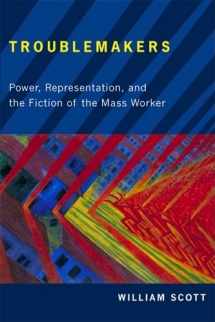
Troublemakers: Power, Representation, and the Fiction of the Mass Worker (The American Literatures Initiative)
ISBN-13:
9780813551890
ISBN-10:
0813551897
Edition:
None
Author:
William Scott
Publication date:
2011
Publisher:
Rutgers University Press
Format:
Hardcover
288 pages
FREE US shipping
Book details
ISBN-13:
9780813551890
ISBN-10:
0813551897
Edition:
None
Author:
William Scott
Publication date:
2011
Publisher:
Rutgers University Press
Format:
Hardcover
288 pages
Summary
Troublemakers: Power, Representation, and the Fiction of the Mass Worker (The American Literatures Initiative) (ISBN-13: 9780813551890 and ISBN-10: 0813551897), written by authors
William Scott, was published by Rutgers University Press in 2011.
With an overall rating of 4.3 stars, it's a notable title among other
books. You can easily purchase or rent Troublemakers: Power, Representation, and the Fiction of the Mass Worker (The American Literatures Initiative) (Hardcover) from BooksRun,
along with many other new and used
books
and textbooks.
And, if you're looking to sell your copy, our current buyback offer is $0.3.
Description
William Scott’s Troublemakers explores how a major change in the nature and forms of working-class power affected novels about U.S. industrial workers in the first half of the twentieth century. With the rise of mechanization and assembly-line labor from the 1890s to the 1930s, these laborers found that they had been transformed into a class of “mass” workers who, since that time, have been seen alternately as powerless, degraded victims or heroic, empowered icons who could rise above their oppression only through the help of representative organizations located outside the workplace.Analyzing portrayals of workers in such novels as Upton Sinclair’s The Jungle, Ruth McKenney's Industrial Valley, and Jack London’s The Iron Heel, William Scott moves beyond narrow depictions of these laborers to show their ability to resist exploitation through their direct actions—sit-down strikes, sabotage, and other spontaneous acts of rank-and-file “troublemaking” on the job—often carried out independently of union leadership. The novel of the mass industrial worker invites us to rethink our understanding of modern forms of representation through its attempts to imagine and depict workers’ agency in an environment where it appears to be completely suppressed.


We would LOVE it if you could help us and other readers by reviewing the book
Book review

Congratulations! We have received your book review.
{user}
{createdAt}
by {truncated_author}


